Erythritol is a non-caloric sugar substitute that delivers almost as much sweetness gram-for-gram as sugar, but without the negative metabolic effects.
Erythritol belongs to the category of sugar alcohols, which are chemically similar to sugar but are not digested by your body. As a result, it provides essentially no caloric energy, which makes it great for people trying to get on a low carb or low sugar diet, but who still have a sweet tooth to satisfy.
Erythritol also tends to be kinder to your gastrointestinal tract than other sugar alcohols, which can cause bloating and gas when consumed in higher doses. That’s because erythritol is not metabolized very well by bacteria. Another benefit of its resistance to bacterial metabolism is a decreased tendency to cause cavities compared to regular sugar.
Looking for the top sources of erythritol? Our researchers have ranked and reviewed the ten best brands.
Research
Rankings
1. Swerve Sweetener
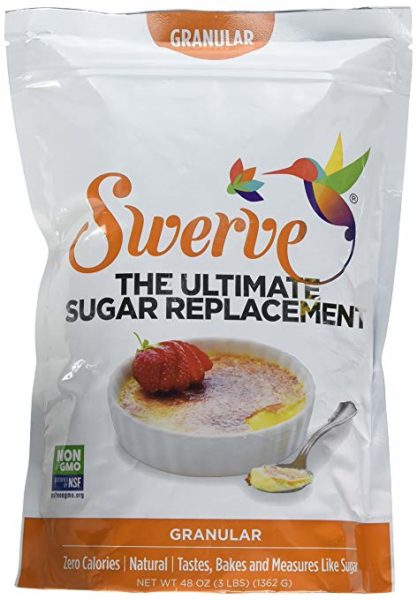
Swerve Sweetener is one of the most popular sugar substitutes due to its unique way of creating the perfect balanced, sugar-like taste.
Since erythritol naturally has a distinctive aftertaste, Swerve pairs this with oligosaccharides and natural flavors to smooth out the taste.
It works equally well for baking and for adding to hot drinks, and it dissolves with ease. This versatility makes Swerve our top pick.
2. Anthony’s Premium Erythritol Sweetener
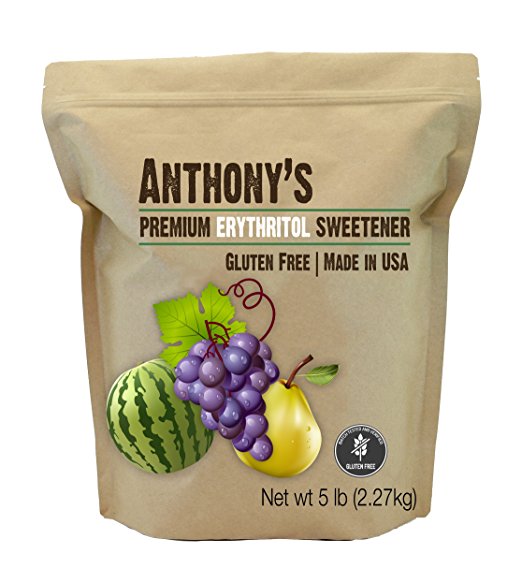
Anthony’s Premium Erythritol Sweetener is an all-natural high-quality sugar substitute that comes in a large five-pound bulk bag.
That’s par for the course for Anthony’s, which specializes in making high-quality bulk sources of common nutrients and sweeteners. If you go through a lot of erythritol, Anthony’s is a great choice.
3. Pyure Organic Erythritol
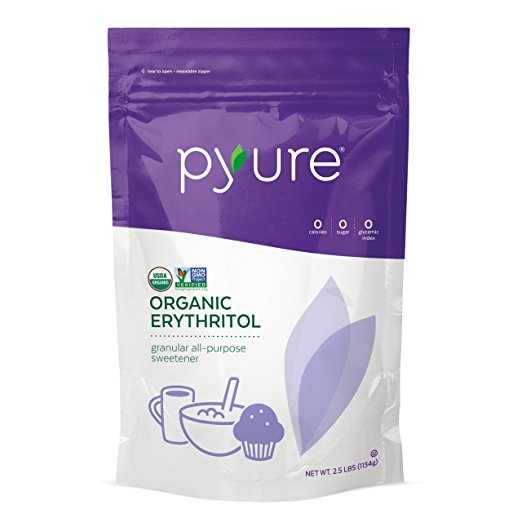
Pyure Organic Erythritol distinguishes itself by being one of the few organically certified erythritol sugar substitutes on the market. If purity and quality of ingredients are important to you, Pyure Organic Erythritol should be your pick.
4. NOW Foods Erythritol
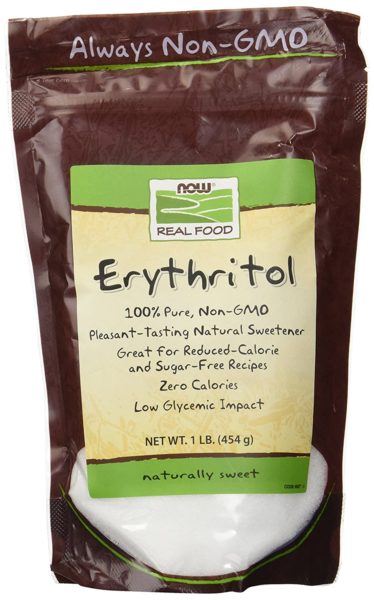
NOW Foods Erythritol is a great option for a simple, reasonably-sized source of erythritol. The 16 ounce bag will last plenty long if all you’re using it for is a dash of sweetness in coffee or tea.
Given that erythritol is only 70% as sweet as sugar, you’ll have to keep in mind that you’ll be using substantially more erythritol in recipes for the same amount of sweetness that you’d get using sucrose.
5. BulkSupplements Erythritol Powder
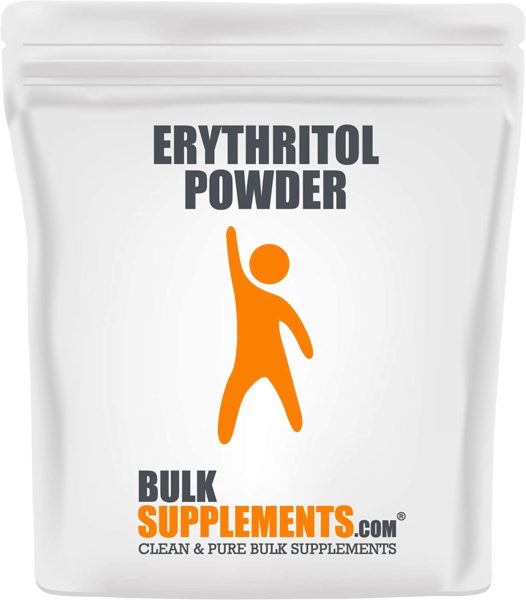
While BulkSupplements usually makes a name for itself with gigantic bulk packages of supplements and nutrients, it’s actually the best source of erythritol for people who only need a small amount.
The 100 gram pouch is perfect for people who entertain guests who are on a low carb diet, or if the only sugar you use is a teaspoon or two in your coffee in the morning.
6. Halefresh Erythritol
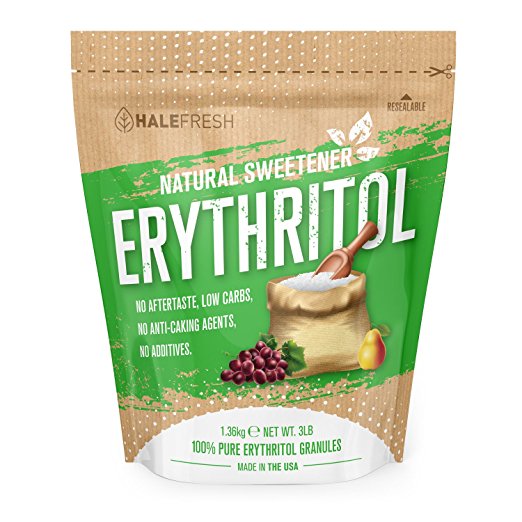
Halefresh Erythritol makes an erythritol sugar substitute that comes in a resealable three pound bag and has no additional ingredients. It’s a great choice for regular users and for people using erythritol for baking. It’s got exactly the same consistency and granule size as regular table sugar, so it’s a great substitute.
7. Whole Earth Sweetener Co Erythritol
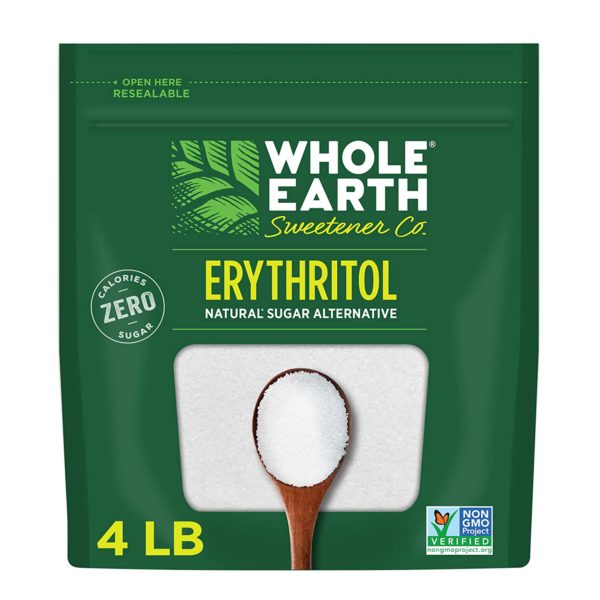
At four pounds per bag, this erythritol sweetener is a solidly-sized bulk buy. Aside from that, it doesn’t have much in the way of defining features that make it stand out from the crowd, but if you are interested in bulk sizing it’s not a bad choice.
8. So Nourished Erythritol
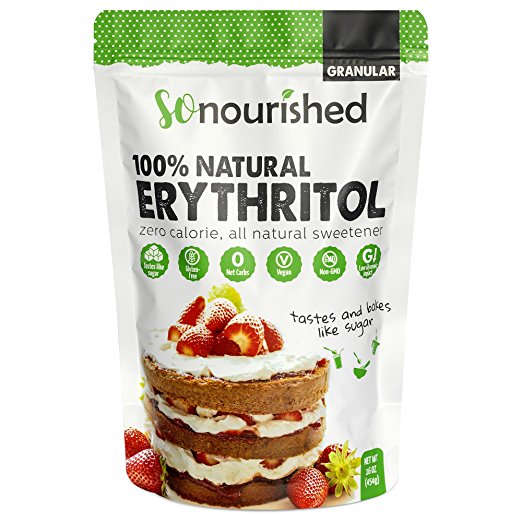
So Nourished Erythritol is another source of 100% pure and all-natural erythritol. It’s quite popular thanks to its similar granular size as sugar for baking, which makes it a good choice for substitution in your favorite recipes.
Resealing the bag is not quite as easy, so you might want to pair this with a plastic container to keep the erythritol fresh.
9. Hoosier Hills Farm Erythritol
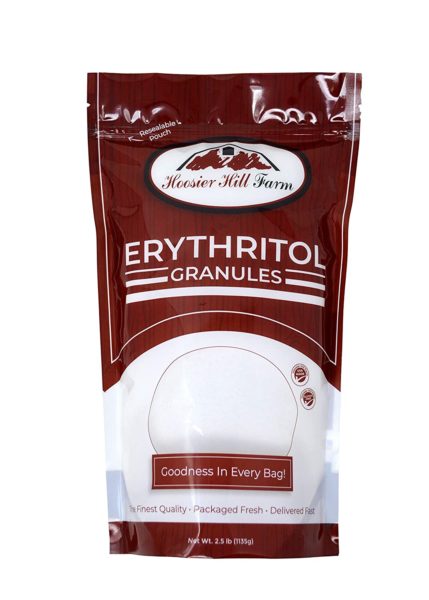
Hoosier Hills Farm Erythritol comes from an American-made facility and is packaged in a two and a half pound bag. It’s 100% pure erythritol; the only downside is that the bag can be tricky to reseal when it’s fairly full. Despite this minor drawback, it’s still a very good bulk source for a sugar substitute.
10. So Nourished Erythritol Monk Fruit Blend
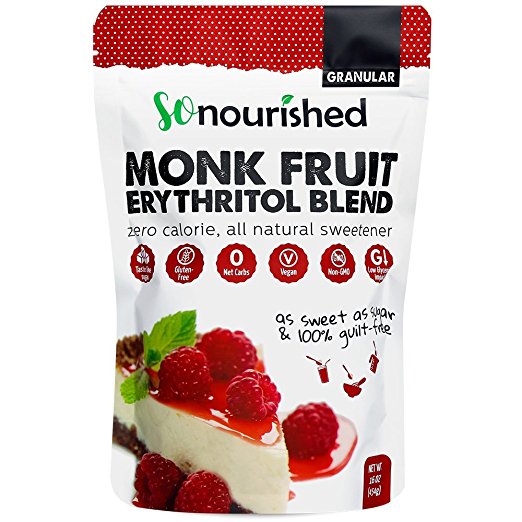
If the distinct taste of erythritol is off-putting for you, So Nourished has a solution. By using erythritol along with monk fruit extract, which is another natural non-caloric sweetener, So Nourished achieves a smoother and more well-balanced taste. The package isn’t so big, though, so it may not be the best option for bulk users.
Category winners
Best erythritol overall: Swerve Sweetener
Swerve takes our top spot overall thanks to its creative use of natural flavors and oligosaccharides to smooth out any lingering aftertaste effects. This bulk bag is great for just about any use, whether that’s baking, hot beverages, or adding sweetness to shakes and smoothies.
Best erythritol for baking: Anthony’s Erythritol
Anthony’s makes great all-natural baking products, and this five-pound bag is a real winner when it comes to baking large recipes. It’s 100% pure, so you don’t have to worry about any other ingredients interacting with your baking recipes.
Best erythritol for coffee and tea: Pyure Organic Erythritol
With an organic certification and ground to evenly-sized granules, Pyure Erythritol is perfect for hot beverages. The size of the bag isn’t too big, and its 100% pure formulation won’t leave any sediment in your mug.
Best erythritol for weight loss: Swerve Sweetener
If you’re trying to lose weight but can’t shake your sweet tooth, Swerve Sweetener is the best choice. Thanks to its smooth, natural taste, you’ll barely notice the lack of calories when adding sugar to recipes.
Best erythritol for keto diet: Pyure Organic Erythritol
Keto dieters will mostly find themselves using erythritol in coffee, tea, and other foods and drinks where a dash of sugar usually makes all the difference. Pyure Organic Erythritol lets you get the same sweetness with zero calories, and no hit to your body’s metabolic level.
Best erythritol for diabetics: Anthony’s Erythritol
Unlike some other sugar substitutes, erythritol has zero effect on blood sugar, making it an excellent choice for diabetics. Anthony’s Erythritol is our recommendation in this category because of its 100% pure formulation and the bulk-sized bag.
Who should buy erythritol?
Erythritol is great for persons of any age looking to avoid sugar for either health or diet reasons. It’s especially beneficial for diabetics that need to watch their blood sugar or insulin levels. If you are prone to cavities, erythritol is a great option to satisfy your sweet tooth.
Pregnant women and children should avoid consuming erythritol since there are no long term studies to prove it’s 100% safe for these types of populations.
How we ranked
Since erythritol is a processed sugar alcohol that helps sweeten foods and drinks without sugar, purity, and quality are of paramount importance. Any product containing anything other than sweetness was axed since we wanted to keep calories and sugar absolutely limited. Products like Anthony’s Premium and NOW Foods ranked highly for providing 100% pure erythritol powder.
We also looked at any additional ingredients added to the sweetener bag. Because erythritol can taste a little funky, we looked for products that added a little bit extra to smooth out the taste. Products like So Nourished and Swerve Sweetener added supporting agents like oligosaccharides and monk fruit to provide a more natural sweet taste.
Because erythritol is a man-made substance, there wasn’t a big fear of pesticide use. However, certified organic supplements, like Pyure, were rewarded for the commitment to purity.
Benefits
Erythritol is a plant-derived sugar substitute that’s virtually zero-calorie. It can be used for baking, it tastes similar to sugar, and unlike so many other sugar substitutes, doesn’t promote intestinal problems.
Used in Japan for about 25 years now, erythritol is used to sweeten beverages, desserts, yogurt, and home-baked goods. It’s available in powdered or granulated form, just like sucrose (table sugar).
However,it does not have the same negative health effects that sugar has, like disrupting your glucose metabolism and increasing risk for obesity and metabolic syndrome or type two diabetes.
Erythritol is a sugar alcohol, but because if the way it’s digested it doesn’t carry the unpleasant and sometimes dangerous side effects that accompany other sugar alcohol sugar substitutes.
Erythritol does not affect blood sugar or insulin levels. Diabetics have been onto erythritol for years. That’s because it does not affect blood sugar or insulin (1). The reason is that like other sugar alcohols, erythritol doesn’t get fully digested by the body, if it gets digested at all.
Erythritol is absorbed very quickly by the small intestine and then excreted in the urine.
That leaves only about 10% of what you consume to enter the colon (2). In lab studies, erythritol isn’t even prone to becoming broken down by bacteria when left exposed for 24 hours. That means it’s going to pass right on through when consumed.
Erythritol does not cause cavities. Because erythritol cannot be metabolized by the bacteria in your mouth, it is far less likely to lead to cavities compared to regular sugar.
Researchers have found that erythritol is noncariogenicitic. In other words, it doesn’t react with the bacteria found in the human mouth (as you’ll read in just a bit, what’s true for the mouth is also true for the gut).
Therefore, it won’t cause lactic acid to be produced, and it won’t contribute to the formation of plaque (3). Plaque, of course, leads to the breakdown of the enamel lining of your teeth, and eventually to the development of cavities.
Among sugar alcohols, erythritol is the least likely to cause gastrointestinal side effects. Since only a tiny percentage of it even reaches the colon there’s very little chance any gastrointestinal distress is going to occur.
Usually, the reason why sugar alcohols can cause gastrointestinal side effects is that your body cannot digest and absorb a sugar alcohol, but the bacteria in your gut can. As a result, they metabolize the sugar alcohol and produce gas, bloating, and other unpleasant symptoms.
Erythritol, on the other hand, is not metabolized by most bacteria. Therefore, there’s no gas produced and no (or at least less) chance of gastrointestinal problems
. People with irritable bowel syndrome have found that erythritol tends not to provoke symptoms to the same degree that other sugar alcohols do, so if you have gastointestinal issues with other sugar substitutes, using erythritol instead may be worth a shot.
Erythritol is similar in use to artificial sweeteners. Unless you’re diabetic, the difference between erythritol and artificial sweeteners like Equal comes down to personal preferences and how your body responds to each option.
Keep in mind that “sugar free” doesn’t always mean “calorie free” or “carb free”. Erythritol does contain a few calories per gram whereas the artificial options are completely absent of calories. A serving size of 1 teaspoon contains 4 grams of carbs but no sugars (4).
The glycemic index of erythritol is much lower than an equivalent amount of table sugar, even after controlling for caloric content. One of the reasons why table sugar is so harmful comes down to its glycemic index: the rate at which it causes a spike in blood sugar.
Erythritol, calorie for calorie, does not cause the same rapid spike in blood sugar. This combines with its vastly lower caloric content when matched with sugar for sweetness and the result is a sweetener that is much easier on your metabolic system and much better for your metabolic health.
Side effects
Sugar alcohols like erythritol have a bad rap, mainly because some of them cause bloating and diarrhea. Sugar alcohols are polyols, which are known to cause issues in the GI tract. For some, consuming sugar alcohols produces IBS-like symptoms…bloating, gas, intestinal pain and diarrhea.
Sorbitol, xylitol and malitol are the real culprits here, in terms of food ingredients to watch out for. They’re used mainly in sugar-free gum and sugar-free desserts. Gum isn’t a problem since most of us don’t chew enough gum for the total sugar alcohol content to add up to very much.
As mentioned above, erythritol is generally not as bad as other sugar alcohols when it comes to gastrointestinal side effects, but it’s still something to be aware of.
Erythritol does have a distinctive “cool” aftertaste that gives it a slightly different flavor profile than pure sugar. Some top brands of erythritol combine ingredients like stevia, monk fruit extract, or fructooligosaccharides to smooth out the sweetness and flavor profile.
That being said, not everybody minds or can even taste the aftertaste of pure erythritol, so you’ll have to see whether the specific taste bothers you or not. If it does, try a combination sweetener.
FAQ
What is erythritol? Erythritol is a sugar alcohol, that is used as a sugar substitute.
What are the dangers of erythritol? As with sugar alcohols, the effects of erythritol are relatively insignificant to the average consumer, and the effects that may occur do not affect a large majority of those consuming the substance. Some of the side effects that some people may experience include diarrhea, headaches, bloating, and an upset stomach.
Those who experience significant side effects from consuming erythritol are likely allergic or intolerant to the substance. Before consuming larger amounts of erythritol, it is recommended that a person consume smaller amounts to determine their body’s natural reaction to the substance.
Is erythritol healthy? Erythritol is a great alternative to sugar that does not lead to a drastic blood sugar and insulin spike. This makes it a safer alternative for diabetics and will help the average person maintain consistent blood sugar levels while eating sweet foods.Erythritol also has less of a negative impact on your teeth, specifically reducing decay, plaque, and cavity development (5).
Is erythritol calorie free? Erythritol is a relatively low-calorie option and can be a solid recommendation for those looking to lose weight or reduce caloric intake. Using a natural sweetener like erythritol allows dieters to consume somewhat sweet foods without the negative health and caloric effects of eating excess sugar. Erythritol is also not connected to the progression of any health issues like sugar is. Sugar intake often correlates with an increase in chronic diseases and conditions, such as diabetes, obesity, and cardiovascular issues. For individuals struggling with such conditions, or that have a family history of them, erythritol is a great option for preventing issues while still being able to consume sweet foods (6).
Is erythritol in stevia? Erythritol is not an ingredient in stevia, as they are two entirely different sweetener products. The most significant difference between the two substances is their position on the sweetness index. While they are both considered sweetener, stevia is about 200 times sweeter than erythritol. In reference, erythritol is about 70% as sweet as regular table sugar.
The other notable difference between these two sweeteners is their caloric value. Erythritol has about 0.24 calories per gram, while stevia is a zero-calorie sweetener. On average, one gram of normal sugar has about four calories. Given this data, erythritol and stevia are both viable sugar alternatives with relatively few negative effects on the body.
Does erythritol have a laxative effect? Erythritol rarely has a laxative effect when consumed in normal amounts. However, when erythritol is consumed in larger amounts or when the person consuming the sweetener has some type of intolerance, it may cause laxative like effects.
Is erythritol safe to consume on a keto diet? The major focus of the keto diet is reducing the intake of carbohydrates and maintaining blood sugar levels. With that said, erythritol is a great sweetener option for those on a ketogenic diet looking to maintain the diet and its effects. Erythritol doesn’t spike blood sugar, making it safe for a keto diet.
Does erythritol make you gain weight? Erythritol does not directly lead to weight gain and, in fact, is a great tool for those looking to lose weight. This low-calorie option is an incredible alternative to sugar in both its caloric value and reduction of negative effects related to excess sugar consumption.
Are sugar alcohols bad for you? In general, sugar alcohols do not have much of a negative effect on the body. Most research supports the concept that sugar alcohols actually have health benefits that regular sugar does not offer. Like any supplement, excessive use can lead to health conditions or issues.
Is erythritol a healthier substitute for sugar? Erythritol is by far one of the healthiest substitutes for sugar on the market today. There are also other sugar alcohols and sweetener alternatives that are available in place of using regular sugar. Some of these substitutes include xylitol, stevia, and honey.
Why would you use erythritol? Erythritol is a sugar alcohol used as a substitute for sugar products. Erythritol, in particular, is used to sweeten beverages and food without the negative health effects and consequences of sugar consumption.
Can erythritol increase blood sugar levels? Erythritol is a significantly healthier option as compared to table sugar when it comes to maintenance of blood sugar levels. After consuming a large amount of regular sugar on a regular diet, the body’s blood sugar level typically spikes. However, because erythritol is much less sweet than regular sugar, the change in blood sugar after consuming erythritol is nonexistent. Erythritol is a great sweetener alternative for diabetics and those with unstable blood sugar levels.
Is erythritol a carbohydrate? Erythritol is considered a carbohydrate and is specifically classified as sugar alcohol. On average, one teaspoon of erythritol has about four grams of carbohydrates. In regards to carbohydrate intake and values in a ketogenic diet, erythritol produces zero net carbs. This means that the amount of erythritol consumed does not contribute to the total carbohydrate value throughout the day, allowing for other carbohydrates during the day.
How many calories does erythritol contain? Erythritol contains 0.24 calories per gram.
Is erythritol the best sugar substitute? Because sugar alcohols contain calories and may lead to a slight increase in blood sugar levels after consumption, substances like erythritol are not the greatest sugar substitute. Natural products, such as stevia, may be better as they have zero-calories and provide similar levels of sweetness, as compared to sugar (7).
How much is too much erythritol? While the Food & Drug Administration has not released an official suggestion for the recommended daily limit when it comes to erythritol, many sources suggest consuming less than 50 grams per day. This varies based on a person’s body weight.
Is erythritol expensive? The benefits of erythritol cannot be denied, but the price of this sweetener is significantly higher than regular sugar. Not only is erythritol more expensive to produce than other sugar alcohols and sugar itself, but it also has a sale price of about 50 times greater than regular sugar.
Is erythritol banned in Europe? It’s not banned in Europe, just limited. The European Food Safety Authority (EFSA) has declared erythritol safe for use in soft drinks at a maximum level of 1.6%.
Are sugar alcohols bad for you? Sugar alcohols are popular, low-calorie sweeteners and are well tolerated in low doses. Large amounts of some sugar alcohols, may cause intestinal issues like bloating and diarrhea. Erythritol seems to have the fewest side effects compared to other sugar substitutes.
Does erythritol affect ketosis? Since they can kick you out of ketosis, if consumed in too high of a dose, most sugar alcohols kept to a minimum on a ketogenic diet. Erythritol is banished from this list since it is metabolized differently and does not affect blood glucose.
Does erythritol have an aftertaste? Erythritol does have a distinctive aftertaste that gives it a slightly different flavor profile than pure sugar.
What is a substitute for erythritol? Xylitol is the closest option to a erythritol and would be an appropriate substitute.
Does erythritol affect blood sugar? No, erythritol does not affect blood sugar or insulin levels, making it perfect for diabetics.
How is erythritol absorbed in the body? Erythritol is about 90% absorbed by the small intestine and then excreted in the urine. The last 10% usually finds its way to the colon and leaves that way.
Does erythritol cause oral cavities? Erythritol does not cause cavities since the cavity-causing bacteria in your mouth can’t feed on it.
Can erythritol cause plaque? Plaque leads to the breakdown of the enamel lining of your teeth, and eventually to the development of cavities. Researchers have found that erythritol is non-cariogenicitic and won’t contribute to the formation of plaque.
Can erythritol cause digestive issues? Gastrointestinal side effects occur when your body cannot digest and absorb sugar alcohol, but the bacteria in your gut can. When bacteria metabolize sugar alcohol, it can produce gas, bloating, and other unpleasant symptoms. Erythritol is not metabolized by most bacteria, so there’s no gas produced, so their’s less of a chance of digestive problems.
Does erythritol affect IBS? Yes, erythritol can provoke IBS symptoms but to a lesser degree than other sugar alcohols. This makes erythritol a better sweetener alternative for those suffering from IBS.
Is erythritol similar to artificial sweeteners? Erythritol is similar in use too artificial sweeteners but tends to produce fewer side effects.
Is erythritol calorie-free? While erythritol is sugar-free, it does contain a few calories and carbs, specifically 4g of carbs per 1tsp.
Does erythritol have the same glycemic index score as sugar? The GI score of erythritol is much lower than the equivalent amount of table sugar. This means that calorie for calorie, erythritol provides a smaller blood sugar spike than table sugar and is better for your health.
Does erythritol taste like sugar? No, erythritol does not taste like sugar, instead of providing a “cool” aftertaste. Because of this, some companies choose to include other sweetener ingredients like stevia and monk fruit to round out the flavor.
How much erythritol can be tolerated? Some research shows that 1 gram per kg of bodyweight of erythritol can be tolerated. Other studies show that eating 50g in a single serving can cause digestive issues and nausea. Its recommended to start low and slowly increase the amount so your body gets used to the erythritol.
Why do sugar alcohols cause bloating? Sugar alcohols like erythritol have a bad rap, mainly because some of them cause bloating and diarrhea. This happens because the bacteria in your intestines break down the sugar alcohols and release gas, causing bloating, pain, and sometimes diarrhea. However, erythritol tends to produce fewer side effects when compared to other sugar alcohols like sorbitol, xylitol, and maltitol.
How many calories does erythritol contain compared to other sweeteners? Erythritol contains a mere 6% of the calories of sugar, clocking in at 0.24 calories per gram (sugar contains 4 calories per gram). Other sweetness like xylitol, contain about half of sugar around 2.4 calories per gram. Despite the lack of taste, erythritol still contains arena 70% of the sweetness of sugar.
How much erythritol is absorbed in the bloodstream? Around 90% of the erythritol that you eat is absorbed in the blood. The remaining 10% is digested in the colon.
How is erythritol different than other sugar alcohols? Erythritol is different than almost all other sugar alcohols because it contains fewer calories per gram and resists fermentation by bacteria in your colon.
Why does erythritol have almost no calories? Erythritol has nearly zero calories because your small intestine absorbs it quickly and gets it out of your body through urine in usually less than 24 hours, giving erythritol almost no chance to metabolize and turn into energy.
Is erythritol a carb? Erythritol does have 4 grams of carbohydrates per teaspoon, but zero net carbs. As such, if you are counting carbs for a special diet like Keto or Atkins, erythritol wouldn’t count towards your daily carb allowance, making it perfect when you are craving sweet foods, but can’t afford the carbs.
Related Articles
Recap
Erythritol might make a food purist shudder, but let’s be real: we like our sweets. The over-consumption of sugar is now an endemic, global, and growing problem causing a myriad of serious health problems.
Erythritol is a great way to swap out sugar with something that’s equivalently sweet but does not have the negative health effects. Erythritol does not cause the massive spike in blood glucose that you get with table sugar, and its caloric content is substantially lower for a given amount of sweetness.
Moreover, erythritol has a much better side effect profile than other sugar alcohols. It is not digested very well by bacteria, which gives it the twin benefits of not causing tooth decay and cavities, and not causing gastrointestinal symptoms like bloating and gas.
While eliminating sweeteners from your diet is a noble long-term goal, erythritol is an excellent way to sustain some of the sweetness in the foods you eat and the beverages you drink, without sustaining the negative health effects associated with high sugar consumption.
Try getting a top-ranked erythritol sugar substitute and swapping it out in your next baking recipe or substituting it for sugar in coffee or tea—you’ll be better off in the long term, and just as happy with the taste.
For BodyNutrition‘s #1 Erythritol recommendation, click here.